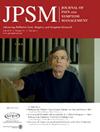姑息治疗培训后的职业轨迹:法国医疗实习生全国电子调查。
IF 3.5
2区 医学
Q2 CLINICAL NEUROLOGY
引用次数: 0
摘要
背景:姑息治疗已成为医疗保健的一个重要组成部分,对专业培训的需求日益增加。在法国,2019年推出了新的一年制姑息治疗文凭,以在各个医学专业传播姑息治疗知识。该项目在住院医师的最后一年提供,包括两个为期六个月的缓和医疗机构实习和四个全国性的研讨会,主题包括症状管理、伦理和沟通。然而,这种培训对医生职业道路的影响仍未得到充分探讨。目的:本研究旨在评估目前接受姑息治疗培训的医生的做法,以及培训如何影响他们的职业选择。方法:对2019年至2023年间完成姑息治疗培训课程的所有医生进行全国性电子调查。数据是通过包含培训完成情况和当前实践的36个问题的调查收集的。结果:我们联系了179名医生。在排除了40名未完成学业的学生后,合格的样本包括139名受访者。其中,81例获得完全应答,应答率为58%(81/139)。其中52人目前在专门的姑息治疗机构执业。有趣的是,88.5%不直接从事姑息治疗的人仍将姑息治疗纳入其日常工作。培训课程结束后,打算专门从事姑息治疗的医生比例是之前的三倍。结论:本研究强调了姑息治疗培训在塑造医生职业道路和在医学专业传播姑息治疗实践方面的重要作用。本文章由计算机程序翻译,如有差异,请以英文原文为准。
Career Trajectories After Palliative Care Training: A National E-Survey of Medical Interns in France
Background
Palliative care has become a crucial component of healthcare, with an increasing need for specialized training. In France, a new one-year palliative care diploma was introduced in 2019 to disseminate palliative care knowledge across various medical specialties. Offered in the final year of medical residency, the program includes 2 six-month internships in palliative care settings and four national seminars covering topics such as symptom management, ethics, and communication. However, the impact of this training on physicians' career paths remains underexplored.
Aim
This study aimed to assess the current practices of physicians trained in palliative care, and how the training influenced their career choices.
Methods
A national e-survey was conducted, aimed at all physicians who completed the palliative care training course between 2019 and 2023. Data were collected through a 36-question survey covering training completion and current practices.
Results
We contacted 179 physicians. After excluding 40 responses from those who had not completed their diploma, the eligible sample consisted of 139 respondents. Of these, 81 complete responses were obtained, yielding a 58% response rate (81/139). Of these, 52 were currently practicing in specialized palliative care settings. Interestingly, 88.5% of those not practicing directly in palliative care still integrated a palliative dimension into their daily work. The proportion of physicians intending to work exclusively in palliative care tripled after the training course compared to before.
Conclusion
This study highlights the significant role of the palliative care training in shaping physicians' career paths and disseminating palliative care practices across medical specialties.
求助全文
通过发布文献求助,成功后即可免费获取论文全文。
去求助
来源期刊
CiteScore
8.90
自引率
6.40%
发文量
821
审稿时长
26 days
期刊介绍:
The Journal of Pain and Symptom Management is an internationally respected, peer-reviewed journal and serves an interdisciplinary audience of professionals by providing a forum for the publication of the latest clinical research and best practices related to the relief of illness burden among patients afflicted with serious or life-threatening illness.

 求助内容:
求助内容: 应助结果提醒方式:
应助结果提醒方式:


